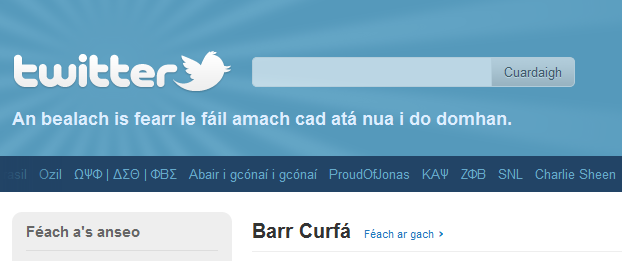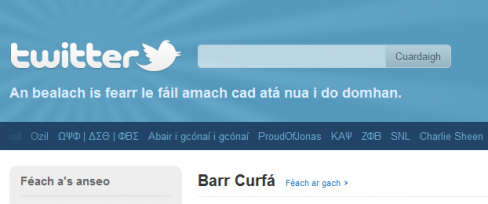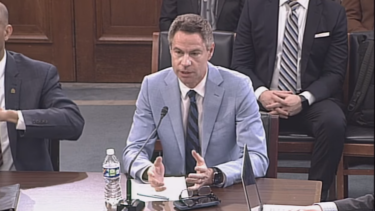It is probably best, for full disclosure and to assuage my guilt, to admit that my Irish is not great. In fact it’s horrendous; I can remember the few stock phrases that we all recall from Primary School, “An bhfuil cead agam dul go dtí an leithreas”, as well as a couple of choice curse words. After that my lingual abilities become an embarrassment, yet on the social web there is a passionate community of Irish language speakers who are tweeting and status-updating as Gaeilge.
But what place does Irish hold in the social media age? Is the one of the oldest continuously spoken languages in the world surviving online or is it being drowned out by our colonial mother tongue.
I spoke to Niamh O’Sullivan, projects executive with Comhdháil Náisiúnta na Gaeilge an umbrella organisation that represents 24 Irish language bodies, including Conradh na Gaeilge, Gael Linn, Gaelscoileanna. Comhdháil Náisiúnta na Gaeilge are frequent users of social networking websites to promote their activities and the Irish language, they can be found on Facebook and on Twitter @gaelport.
I began by asking Niamh if there was any value for Irish language speakers in using Twitter or Facebook ,
“I would say that the development of social media has been of great benefit for Irish language organisations. It’s very cost effective and is a useful way of connecting with Irish speakers online.” These connections are important, social media, she tells me, is not simply the narcissistic tool that some parts of the media have painted it to be. It’s value can be found in it’s ability to connect people with similar interests, regardless of their location.
“Irish speakers can often feel isolated, particularly those who are not living in a Gaeltacht region or are living in areas such as Dublin, Belfast or Galway where there isn’t real vibrant Irish language community. Social media gives them opportunity to join in a community and feel connected.
“Irish speakers or gaeilgeoirí can just log on to their Facebook and keep up to date with what’s happening, find out about events and news and can interact with each other.”
This community of users is not just limited to those with a grasp of Irish but people who’s passion for the language comes more from admiration than fluency. The passion for the language goes beyond some gaeilgeoirí clique but is open to all with an interest in Irish affairs.
“We get great feedback from other twitter users on stories we feature or ideas for promoting the language in other areas. The response during the election, in the wake of the controversy surrounding the Fine Gael proposal to reduce the status of Irish at Leaving Certificate level has been huge. As has the response to the debate on TG4.
“The response has been especially huge on Facebook. A large number of people have joined a page set up by the USI protesting against the move and other Irish language organisations campaigning on the matter. The feedback on our own Facebook page has been immense.
“Social networks have been an invaluable way of keeping people up to date on the policies of the parties and we have been using Vimeo and YouTube throughout the election campaign to record events. The parties’ various have been were discussed from Donegal to Dublin to Dingle and that has meant a greater level of engagement with Irish speakers and others who support the language.”
But Fine Gael’s view of Irish is not an isolated case, many Irish companies simply don’t use the language, either online or in more traditional media. This lack of visibility can make the job of promoting the language even more difficult,
“I think the top technology companies are doing their bit, both Google and Facebook provide Irish language versions of their services, but more indigenous companies could follow their lead. Google often contact us with press releases as Gaeilge- something many other companies don’t bother doing. Google, I think, has a very positive attitude to multilingualism which is very important.
“But I don’t think native companies realise how much goodwill is out there for the Irish language or how much Irish people want a connection with the language. I do think if a company did a proper social media campaign as Gaeilge that there would be a very good response. It’s something maybe more companies should look into.”
With this lack of Irish promotion the challenge for organisations represented by Comhdháil Náisiúnta na Gaeilge is simply to remain visible
“Every year for past 2 or 3 years there has been a lá na Gaeilge on Facebook and Twitter on March 17th. This has helped but I do think that this shouldn’t be a one-off. You have to keep visible and in touch with what’s happening and I think it is important that the status updates should tap into the mood of the day and should take place all year.”
So, what would Niamh say to companies and people such as myself who rarely share a culpa focal online,
“Fáilte! Just go for it. Don’t get hung up on the grammar or spelling too much. Use the social media to practice your Irish, to meet other speakers online and to be part of the community online.”













